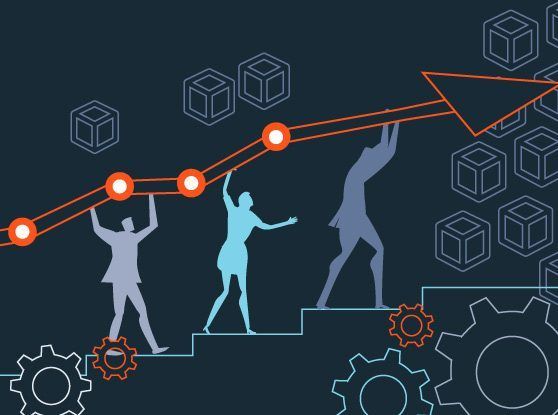
Insight IGNITE Innovation Roundtable: October in Austin (Day 1)

In Austin, Texas, October is known for speed and sound. With the Formula 1 Pirelli 2018 United States Grand Prix race as the backdrop, 40 business and technology leaders representing a range of industries – from retail to healthcare to energy – convened to discuss enterprise digital transformation, challenges, lessons learned and paths forward. The conversation included leaders from traditional businesses like McDonald’s and USAA to startups like Thankful.ai, Devo and Darktrace.
While we took in nail-biting races at the Circuit of The Americas (COTA), the first two days of the event were dedicated to the fast-paced transformation stories of more than 20 presenters and panelists sharing their insights.
Some key themes emerged on the first day of the event:
Disruption is closer than it looks – ignore customer behavior at your peril.
Disruption is closer than it looks – ignore customer behavior at your peril
Ted Mico, founder of Thankful.AI and a former EVP at Interscope Geffen Records, kicked off the event with a look back at a disruption that shook an age-old industry – music -- to its core. What began with Napster, in 1999, has changed the way people access music,and this digital tsunami has had reverberations not only for other forms of entertainment, but advertising, sports, and traditional enterprise business too. “Industry executives didn’t see it coming,” Mico said, and rather than attempting to figure out how to monetize new forms of access, record labels spent years embroiled in lawsuits trying to prevent the convenience this new click-and-play access enabled.
Convenience that the consumer was willing to pay for returned win 2003 with the advent of iTunes and the iPod, but this also meant the death of the 14-15-song album bundle. This lead to even steeper revenue declines, yet it was only when track sales started to wane that the music industry reluctantly acquiesced to subscription services, namely Spotify. Once again, this resistance to embrace new business models cost the business dearly.
Mico’s words of wisdom: Agility always wins, Pain is the touchstone of all growth, and disruption is always closer than it looks. No matter what your industry, if you want to survive, you should be paying attention to consumer trends.
Every business is now a digital business – and there are six doors you’ll need to go through for successful digital transformation.
Five years ago, Emily O’Halloran, managing director at Accenture Digital Southwest, found herself sitting in the office of an oil and gas executive listening as he explained that his was not a digital business. “I’m not Google,” he said, “I find oil and pull it out of the ground.” Fastforward four years later, that same executive said to her, “I have to go digital.” For O’Halloran, every business is a digital business, but what that looks like depends on how you’re defining digital, and to whom.
Hers is a strong thesis, and O’Halloran, offered up examples ranging from big box traditional retailers, legendary consumer packaged goods makers to iconic software and IT developers as companies that have successfully made a digital transformation. For one retailer, making the transition meant evolving from a store that sold televisions and washing machines to a store that sells advice (with a commitment to match e-commerce giant’s prices). “The salespeople have become advisors who function as CTOs for the home,” she said. Another example illustrates how software stalwarts have moved away from their bread-and-butter platforms to now focusing on Cloud, Opensource, and Artificial Intelligence.
No matter what the industry, O’Halloran believes there are six essential steps to successful digital transformation:
- Create a spark and define the journey;
- Be pragmatic;
- Establish your destination and share the map with employees so you’re all on the journey together;
- Optimize for digital speed by breaking down barriers;
- Open doors to partners; and
- Grow a culture of innovation.
Enterprises must do all six or digital transformation will not be successful. However, without strong sponsorship from the CEO, all six steps cannot be implemented.
Flexible workforce: Not “nice to have,” but MUST have.
Traditional employment for life is increasingly the exception, rather than the norm. The workforce of the future needs to assume that talent is mobile, remote, fluid and seeking challenging work, where skills are matched to projects, and talent is sourced globally. This has implications for recruiting and finding appropriate skills. Alongside this trend is the impact of automation on specific jobs.
The debate at hand shouldn’t focus on whether AI will “steal” human jobs but how it will transform them, says Marcus Sawyerr, Former President of Adecco Group X and now CEO ofYOSS USA
Among the many industries artificial intelligence and machine learning are changing, AI is shaping the way we look for and, as employers, fill jobs. “AI is playing a big role in determining who gets interviewed, and who gets hired,” YOSS, a company that uses AI to streamline the hiring process for companies in service sectors. YOSS is a wholly owned business under the Adecco Group umbrella that emerged out of their Adecco Group X (AGX) digital business unit which Sawyerr set up and ran for two years before taking on his new role at YOSS,
Even in an industry like human resources, using AI can streamline the hiring process, Sawyerr says, and help determine if a person has suitable skills for a certain position. AI can also improve onboarding functions, training, and even scheduling.
AI and cyber make a dynamic duo
While Marcus Sawyerr made the case for AI assisting in hiring, Daniel Doimo – President and COO of Cylance and Nicole Eagan – CEO of Darktrace, showed how AI is transforming cybersecurity. According to Doimo, some 360,000 malware attacks are released every day. There is simply no way humans could even make a dent in combatting that volume of attacks without the help of machines. We used to use antivirus software to combat malware, he explained. Then it was firewalls, then email, browsers and applications. Even with all those layers, more is needed. “AI is not a feature,” said Doimo, “It’s the future of managing attacks at scale.”
Legacy security is no longer sufficient, agreed Darktrace’s Nicole Eagan. More than 7,000 companies are now using her company’s product to detect threats, including transit authorities, nuclear power plants and other essential enterprises. Most companies do not have the resources to hire enough people to combat the threats inside the enterprise, she said. Darktrace’s technology is analogous to the human immune system and is able to detect threats and respond in two seconds. With AI you can create a self-learning system, explains Eagan, just like our immune system does. The attackers are changing their approach all the time and there’s no way to anticipate what they’ll come up with next, hence Darktrace learns and prevents attacks real time.
Eagan and her panel, which included Chief Information Security Officers from McDonald’s, P&G and Palo Alto Networks, agreed that traditional cybersecurity approaches are no longer effective and all enterprises need to look beyond conventional approaches. The panel shared that it’s vitally important to deploy software businesses like Cylance and Darktrace that are leveraging AI while building fundamental machine learning capabilities internally to fight threats that are not yet addressed by the vendor community.
Insight IGNITE Innovation Roundtables bring together C-level business and technology leaders from a variety of global companies – and a range of industries – to explore ideas ranging from the challenges facing businesses in the process of a digital transformation to what machine learning and artificial intelligence mean for the future of business.
Every Insight IGNITE Innovation Roundtable event aspires to deliver world-class thought leadership and insights that accelerate digital transformation, it also provides our guests the opportunity to develop strong personal relationships with peers and share a life experience
Check out Part Two of our highlights from the Austin Insight IGNITE Innovation Roundtable.
The next Insight IGNITE Innovation Roundtable is a one-day event at the McLaren Technology Center in Woking, United Kingdom on 29th November, 2018.









